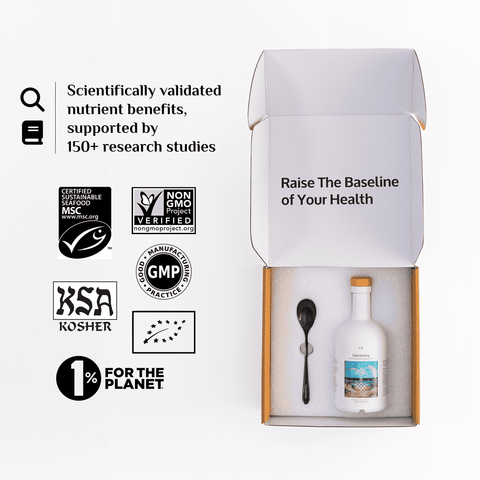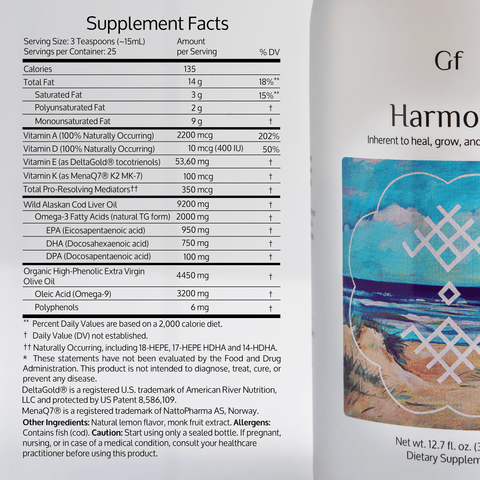Brain fog—that persistent feeling of mental sluggishness, difficulty concentrating, and forgetfulness—can be incredibly frustrating. Could something as simple as a lack of omega-3 fatty acids be at the root of your troubles? Let's explore some key signs and how to take action.
Signs Your Brain Fog Might Be Linked to Low Omega-3 Levels
While not everyone with brain fog has an omega-3 deficiency, the following suggest it could be a factor worth investigating:
- Trouble Focusing: Do you find yourself easily distracted, struggling to stay on task, or having difficulty completing projects? Omega-3s are essential for attention and concentration. [1]
- Forgetfulness: More than occasional misplaced keys – frequent forgetfulness or feeling "scatterbrained" could signal a need for brain-supporting nutrients like omega-3s.
- Mood Changes: Low omega-3 levels have been associated with low mood and irritability. If brain fog goes hand-in-hand with these symptoms, it strengthens the case. [2]
- Diet Deficiencies: Do you rarely eat fatty fish like salmon or sardines? If so, you may be missing out on a crucial source of omega-3s.
- Dry Skin and Hair: Omega-3s play a role in skin and hair health. Chronic dryness or brittle hair could hint at a general deficiency. [3]
What to Do if You Suspect a Deficiency
- Talk to Your Doctor: Share your concerns about brain fog and discuss whether an omega-3 deficiency could be a factor. Your doctor may recommend testing or offer personalized advice.
- Boost Your Omega-3 Intake: Prioritize omega-3 rich foods like fatty fish, consider plant-based sources like flaxseed and chia, or a high-quality supplement such as Harmony™ by Gf. It's a superfood blend of omega-3 in synergy with vitamins A, D, E, K and polyphenols (antioxidant from olives).
- with its potent blend of omega-3, 6, 7 & 9 + vitamins A, D, E K and olive polyphenols, could be a smart addition to your routine.
- Track Your Progress: Pay attention to any changes in your mental clarity, focus, and mood as you increase your omega-3s. This can be helpful feedback both for you and your doctor.
Important Notes
- Brain Fog Has Many Causes: Omega-3 deficiency is just one possibility. It's crucial to rule out other medical conditions with your doctor.
- Not an Overnight Fix: While omega-3s can be powerful, they may not be a miracle cure. Allow time for your body's levels to build up before expecting dramatic results.
Harnessing the Power of Omega-3s
Even if your brain fog isn't solely due to low omega-3s, boosting your intake of these healthy fats is a wise investment in your overall brain health. If a deficiency is to blame, you might just be surprised by the mental clarity that awaits.
References
- [1] Yurko-Mauro, K., McCarthy, D., Rom, D., Nelson, E. B., Ryan, A. S., Blackwell, A., ... & Stedman, M. (2010). Beneficial effects of docosahexaenoic acid on cognition in age-related cognitive decline. Alzheimer's & Dementia, 6(6), 456-464. https://doi.org/10.1016/j.jalz.2010.01.013
- [2] Sublette, M. E., Ellis, S. P., Geant, A. L., & Mann, J. J. (2011). Meta-analysis of the effects of eicosapentaenoic acid (EPA) in clinical trials in depression. The Journal of clinical psychiatry, 72(12), 1577. https://doi.org/10.4088/JCP.10m06634
- [3] McCusker, M. M., & Grant-Kels, J. M. (2010). Healing fats of the skin: the structural and immunologic roles of the ω-6 and ω-3 fatty acids. Clinics in dermatology, 28(4), 440-451. https://doi.org/10.1016/j.clindermatol.2010.03.020
Disclaimer: This article is for informational purposes only and should not be taken as medical advice. Always consult with a healthcare professional before making significant dietary or supplement changes.









